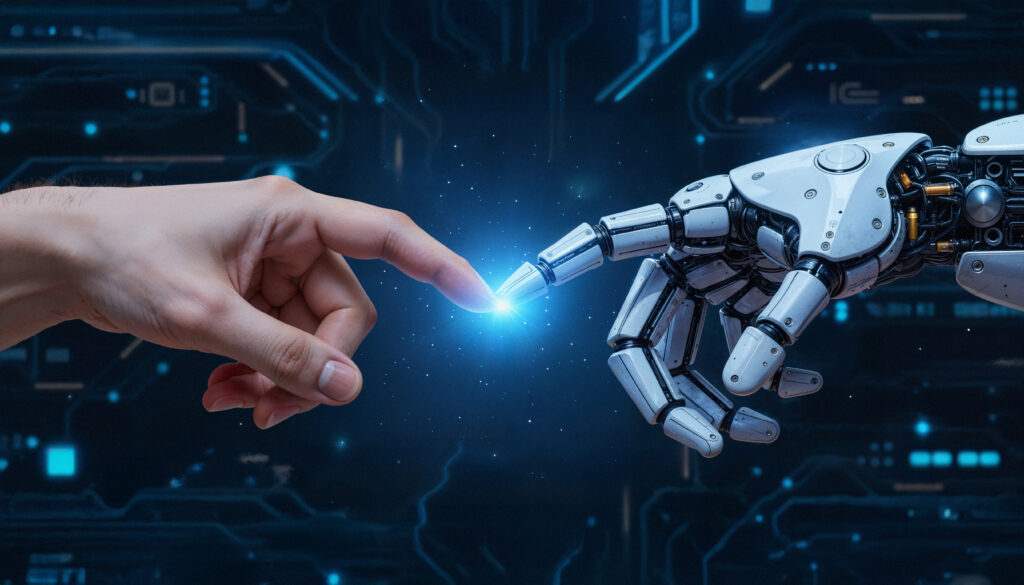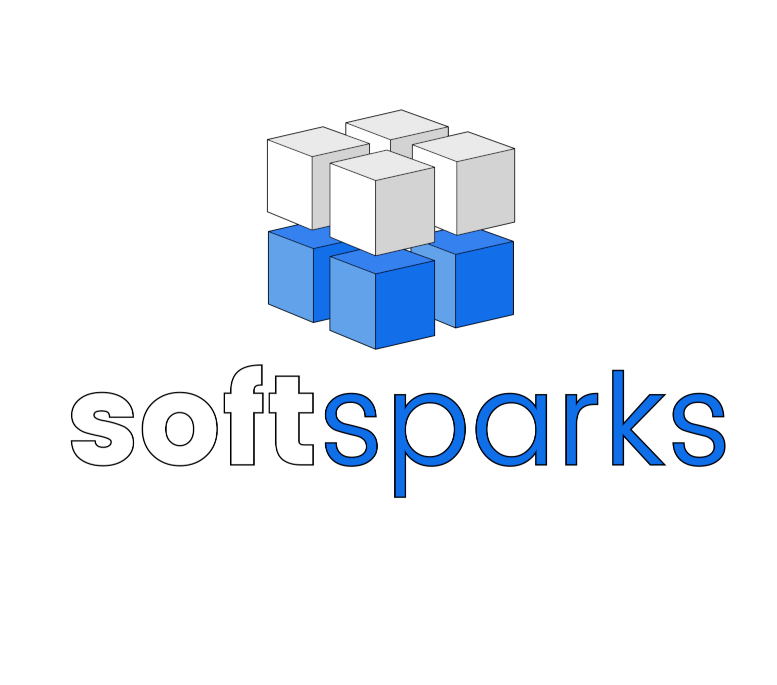The development of AI automation technologies has seen remarkable progress in recent decades. Starting with the first approaches to artificial intelligence in the 1950s, when researchers began to develop algorithms that could automate simple tasks, the field has evolved rapidly. The introduction of machine learning and neural networks in the 1980s and 1990s marked a turning point, as these technologies made it possible to recognize and process complex patterns in large amounts of data.
Table of contents

These advances have been facilitated by the exponential increase in computing power and the availability of large amounts of data, which has enabled the development of more powerful AI models. In recent years, the integration of AI into automation technologies has reached a new dimension. Companies are increasingly relying on intelligent systems that not only perform repetitive tasks, but are also capable of making decisions and adapting to changing environments.
Examples of this include autonomous robots in manufacturing, which not only assemble, but can also carry out quality checks and optimize their work processes. These technologies are not only revolutionizing production processes, but also the way in which companies design their business models and offer their services.
Key Takeaways
- The development of AI automation technologies has increased rapidly in recent years, particularly in the field of machine learning and artificial intelligence.
- The impact of AI automation on the world of work is diverse and ranges from the automation of routine tasks to the creation of new job opportunities in the field of AI development and maintenance.
- The role of AI automation in Industry 4.0 is crucial for increasing efficiency, improving product quality and making production more flexible.
- The ethical and legal aspects of AI automation are of great importance, as questions of responsibility, transparency and data protection need to be clarified.
- The challenges and risks of AI automation include the potential displacement of workers, dependence on technology and the security of AI systems.
The impact of AI automation on the world of work
The effects of AI automation on the world of work are complex and affect both employees and employers. On the one hand, automation leads to an increase in efficiency and a reduction in costs for companies. Routine tasks that previously required human labor can now be performed by machines, leading to a reduction in operating costs.
This enables companies to be more competitive and free up resources for more strategic tasks. On the other hand, there are concerns about job losses, especially in industries that rely heavily on manual labor. Occupations in manufacturing, logistics and even the service sector are increasingly at risk as AI systems can perform these activities more efficiently.
However, the transformation of the world of work through AI automation also requires an adaptation of employees' qualifications. While some professions are becoming obsolete, new occupational fields are emerging that require specific skills in dealing with AI technologies. This is leading to increased demand for specialists in the fields of data analysis, software development and AI management.
Educational institutions and companies are faced with the challenge of developing suitable training programs to prepare the workforce for the demands of the future. The ability to undertake lifelong training is thus becoming a decisive factor for employability in an increasingly automated world.
The role of AI automation in Industry 4.0 is central to the transformation of traditional production processes. Industry 4.0 describes the fourth industrial revolution, which is characterized by the networking of machines, systems and people. In this context, AI plays a crucial role by making it possible to analyze data in real time and make decisions based on it.
Smart factories use AI-supported automation systems to optimize production processes, predict maintenance work and minimize energy consumption. One concrete example of the use of AI automation in Industry 4.0 is the concept of "smart manufacturing". Here, machines are equipped with sensors that continuously collect data about the production process.
This data is then analyzed using AI algorithms to detect patterns and identify potential for optimization.
For example, a company could use predictive analytics to predict when a machine needs to be serviced before it breaks down. This not only reduces downtime, but also significantly increases the overall efficiency of production.
The ethical and legal aspects of AI automation

The ethical and legal aspects of AI automation are an increasingly important topic in society. The emergence of intelligent systems raises questions about responsibility and liability in the event of wrong decisions or damage caused by automated processes. Who is responsible if an autonomous vehicle causes an accident? These issues require a clear legal framework and guidelines to protect both companies and consumers. In addition, there are ethical concerns regarding data protection and privacy.
AI systems require large amounts of data in order to work effectively. This raises questions about the way this data is collected, stored and used. Companies need to ensure that they comply with data protection regulations and are transparent about the information they collect.
The development of ethical guidelines for the use of AI technologies is therefore essential in order to strengthen public trust in these systems.
The challenges and risks of AI automation
| Aspect | Challenges and risks |
|---|---|
| Data protection | Processing large volumes of data carries the risk of data breaches and unauthorized data transfer. |
| Distorted decisions | Algorithms can make biased decisions due to bias in the training data. |
| Job loss | Automation through AI can lead to job losses in certain sectors. |
| Liability issues | Liability issues arise when AI systems malfunction, particularly in the area of autonomous vehicles. |
Despite the many benefits, AI automation also poses considerable challenges and risks. One of the biggest challenges is that many companies struggle to find suitable specialists with the necessary knowledge in the field of AI. The lack of qualified workers can mean that companies are unable to exploit the full potential of their automation technologies.
This in turn can lead to a competitive disadvantage.
Another risk is dependence on technology.
If companies automate their processes to a large extent, there is a risk that they will be less able to react flexibly to changes in the market.
A technical failure or cyberattack could have catastrophic consequences and paralyze the entire production process. It is therefore crucial that companies not only invest in technology, but also in robust security measures and contingency plans.
The future prospects for AI automation technologies
Growth of the market for AI applications
Experts are forecasting continuous growth in the market for AI applications in the coming years. In the field of robotics in particular, intelligent robots are expected to be able to take on increasingly complex tasks that previously required human intervention.
Increasing efficiency and opening up new business areas
This could not only increase efficiency, but also open up new areas of business. In addition, AI automation technologies are expected to evolve to enable even more intuitive interactions between humans and machines.
Future developments and areas of application
Advances in natural language processing could make it easier for humans to communicate with machines, which could revolutionize the use of AI in areas such as customer service or healthcare. The integration of AI into everyday applications is expected to increase and could help to significantly improve people's lives.
The potential applications of AI automation in various industries
The possible applications of AI automation are diverse and extend across numerous industries. One modern solution for this is the Automation with n8na flexible open source platform for workflow automation. In healthcare, for example, AI systems can be used to analyze medical images in order to diagnose diseases at an early stage or optimize treatment plans. By using machine learning, doctors can make more precise diagnoses and develop personalized therapies.
In the financial sector, AI is used to improve fraud detection systems and optimize risk management processes. Algorithms analyze transaction data in real time and identify suspicious patterns or anomalies. This enables banks and financial institutions to react more quickly to potential threats and better protect their customers.
The importance of AI automation for the economy and society
The importance of AI automation for the economy and society cannot be overestimated. Not only does it help to increase productivity, but it also has the potential to significantly boost economic growth. By using intelligent systems, companies can work more efficiently and reduce their costs, which can ultimately lead to lower prices for consumers.
At a societal level, AI automation can help to improve quality of life and tackle social challenges. In areas such as education or environmental protection, automated systems can help to use resources more efficiently and develop sustainable solutions. The integration of AI technologies into various areas of life could therefore not only bring economic benefits, but also have a positive impact on social welfare.
An interesting addition to the topic of Ki automation of the future is the article "Winning customers with Ki and No-code automations". This article explains how companies can win new customers with the help of artificial intelligence and automated processes. The combination of Ki and no-code technologies enables companies to work more efficiently and improve their online visibility. This article thus provides further insight into the many opportunities that automation can offer in the future.
FAQs
What is Ki automation?
AI automation refers to the use of artificial intelligence (AI) to automate processes and tasks in various areas such as production, logistics, healthcare and finance.
How does Ki automation work?
AI automation uses algorithms and machine learning to identify, analyze and automate repetitive tasks. The AI systems are trained to recognize patterns and rules and act accordingly.
What advantages does Ki automation offer?
Ki automation can increase efficiency, reduce errors, cut costs and increase productivity. It also enables the management of complex tasks and the provision of real-time insights.
Which industries can benefit from AI automation?
Ki automation can be used in a variety of industries, including manufacturing, retail, healthcare, finance, logistics and customer service.
What are the future prospects for Ki automation?
AI automation is expected to continue to grow and become established in more and more areas. Advances in AI technology and the increasing acceptance of automation solutions will drive development forward.

Pingback: Further training with AI: the future of professional development
Pingback: The importance of AI certification
Pingback: SEO for AI websites: Tips for better visibility
Pingback: Effective AI-assisted SEO techniques
Pingback: Automation of AI for SEO